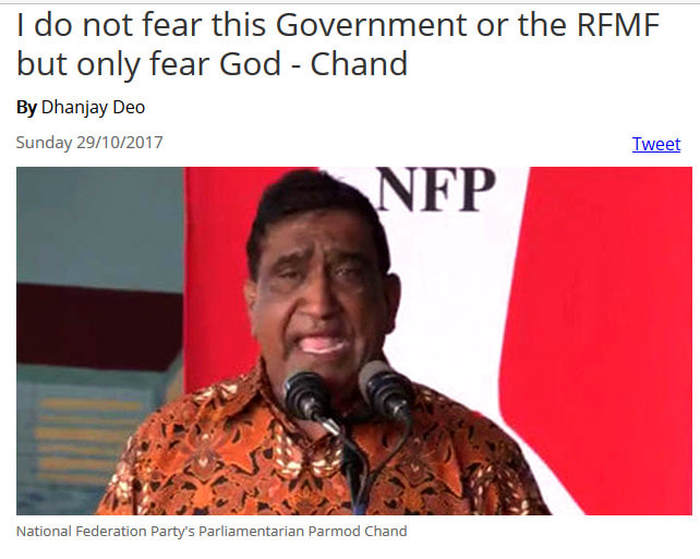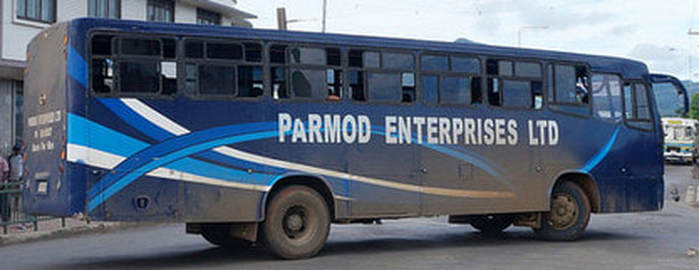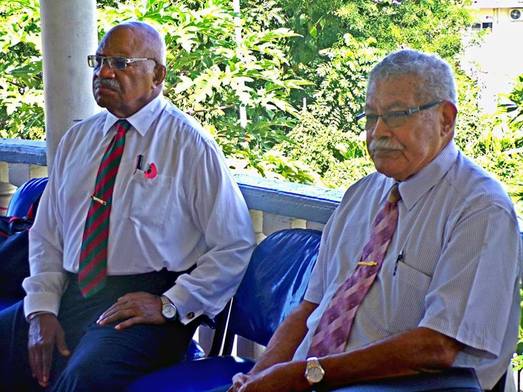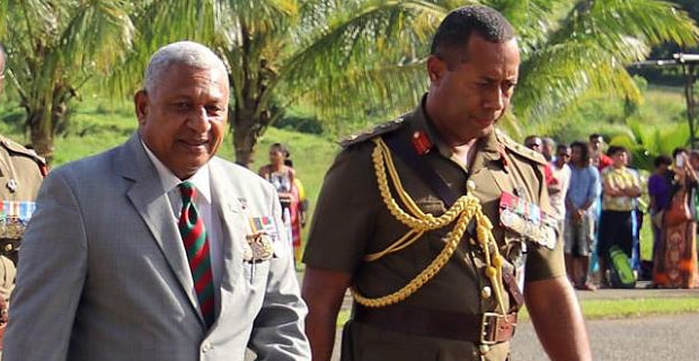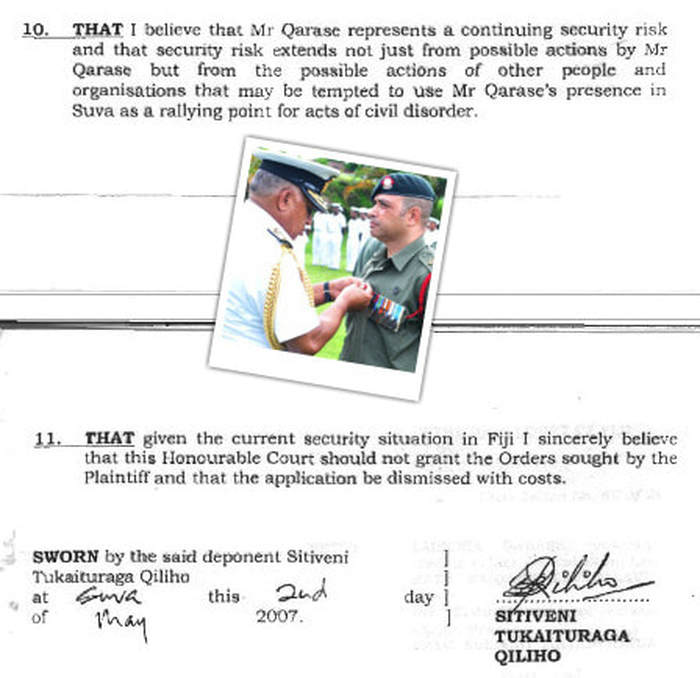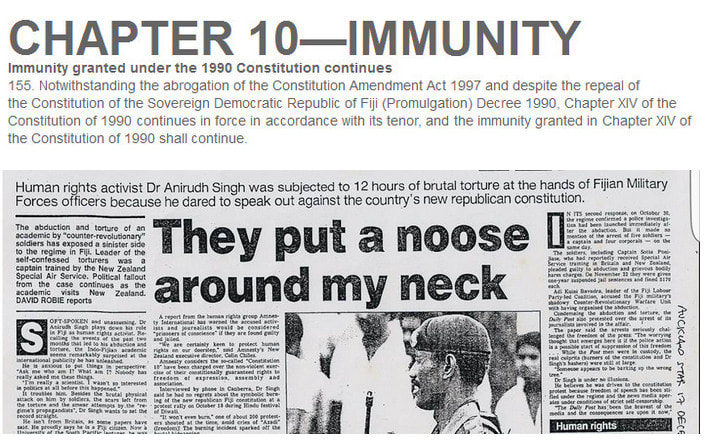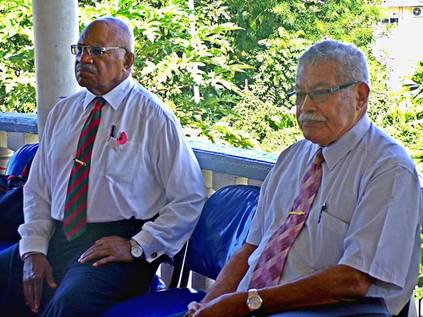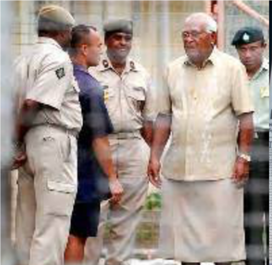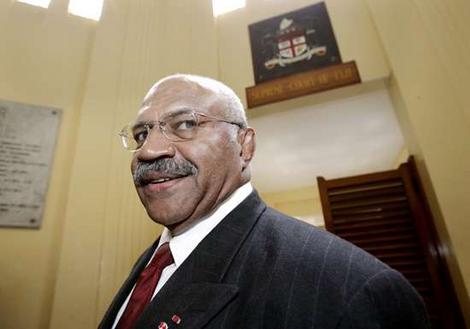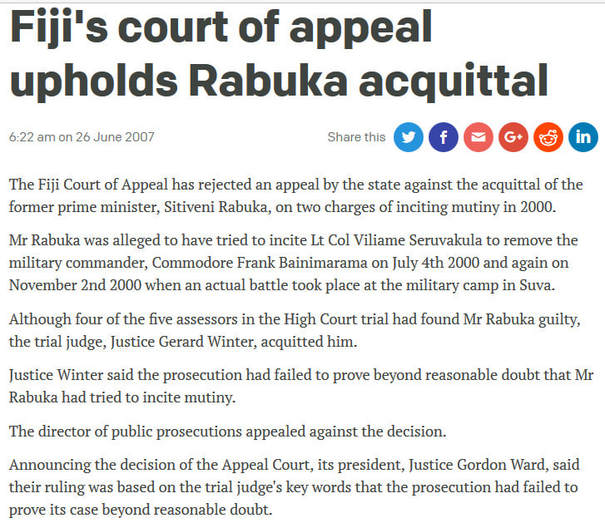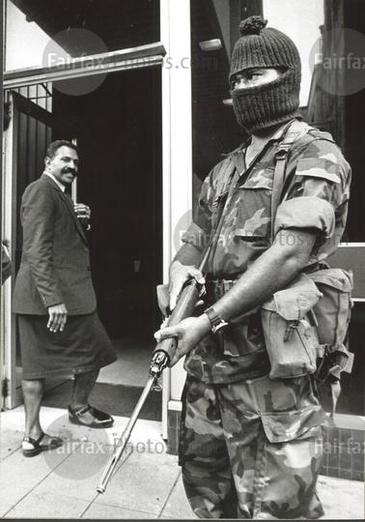“I just want to raise concerns about the continuous comments the Honourable Member of Parliament Parmod Chand keeps making. He is always bringing in the RFMF in his political remarks and we are questioning his motive and the question I ask myself is what is he trying to prove. Mr Parmod Chand’s comments about the RFMF is for political leverage, to gain popularity and votes for elections. The race card is out of the window so his focus has become the Prime Minister and the RFMF. This shows his political immaturity” -
RFMF Chief of Staff, Colonel RATU Jone Kalouniwai
Fijileaks: This NFP barking motormouth will FLEE and HIDE, like the former deposed Prime Minister Laisenia Qarase, under one of his many buses the day RFMF, led by Kalouniwai, strikes back to stop Fiji falling into the hands of the likes of Parmod Chand, Sitiveni Rabuka, and many hardcore racist and nationalist former military men who have infiltrated SODELPA with Rabuka, and are shaping the party's militant agenda for 2018, manipulating Qarase and his status for their own gains. Qarase must not allow himself to become the Coupist Rabuka's GOOSE!
RFMF HITS BACK
From The Fiji Sun, 30 October 2017
Republic of Fiji Military Forces chief of staff Colonel Jone Kalouniwai has questioned the motives of National Federation Party parliamentarian Parmod Chand behind his incessant comments made in the political arena about the security force.
And, he has reminded Mr Chand that RFMF has done a lot for the country and has sacrificed a lot for the Fijian people.
During a rally in Labasa on Saturday, Mr Chand said he feared no one, not the Government and not the Republic of Fiji Military Forces.
Colonel Kalouniwai said this may be a matter of political survival for Mr Chand but for the RFMF, the institution was here to stay.
“I just want to raise concerns about the continuous comments the Honourable Member of Parliament Parmod Chand keeps making.
“He is always brin[g]ing in the RFMF in his political remarks and we are questioning his motive and the question I ask myself is what is he trying to prove.
“Mr Parmod Chand’s comments about the RFMF is for political leverage, to gain popularity and votes for elections.
“The race card is out of the window so his focus has become the Prime Minister and the RFMF. This shows his political immaturity,” Mr Kalouniwai said.
In reminding Mr Chand and the Fijian people what RFMF has done for the country, Mr Kalouniwai said Mr Chand cannot come close to contributing to this nation what RFMF has. He said there was no comparison between RFMF’s contribution to nation building and Mr Chand’s contribution, if any.
“No matter how much he barks at the RFMF, the institution has done a lot and sacrificed a lot for the country but for him this is a matter of political survival.”
Mr Kalouniwai has also advised Mr Chand to stick to ‘bread and butter’ issues of the Fijian people and not drag this country through the muck.
Mr Chand has also previously been very vocal about the RFMF in Parliament following which RFMF had released a statement clarifying some of Mr Chand’s remarks.
From The Fiji Sun, 30 October 2017
Republic of Fiji Military Forces chief of staff Colonel Jone Kalouniwai has questioned the motives of National Federation Party parliamentarian Parmod Chand behind his incessant comments made in the political arena about the security force.
And, he has reminded Mr Chand that RFMF has done a lot for the country and has sacrificed a lot for the Fijian people.
During a rally in Labasa on Saturday, Mr Chand said he feared no one, not the Government and not the Republic of Fiji Military Forces.
Colonel Kalouniwai said this may be a matter of political survival for Mr Chand but for the RFMF, the institution was here to stay.
“I just want to raise concerns about the continuous comments the Honourable Member of Parliament Parmod Chand keeps making.
“He is always brin[g]ing in the RFMF in his political remarks and we are questioning his motive and the question I ask myself is what is he trying to prove.
“Mr Parmod Chand’s comments about the RFMF is for political leverage, to gain popularity and votes for elections.
“The race card is out of the window so his focus has become the Prime Minister and the RFMF. This shows his political immaturity,” Mr Kalouniwai said.
In reminding Mr Chand and the Fijian people what RFMF has done for the country, Mr Kalouniwai said Mr Chand cannot come close to contributing to this nation what RFMF has. He said there was no comparison between RFMF’s contribution to nation building and Mr Chand’s contribution, if any.
“No matter how much he barks at the RFMF, the institution has done a lot and sacrificed a lot for the country but for him this is a matter of political survival.”
Mr Kalouniwai has also advised Mr Chand to stick to ‘bread and butter’ issues of the Fijian people and not drag this country through the muck.
Mr Chand has also previously been very vocal about the RFMF in Parliament following which RFMF had released a statement clarifying some of Mr Chand’s remarks.
Fijileaks: As we pointed out last week, yesterday's VICTIMS like Laisenia Qarase, whom our founding Editor-in-Chief VICTOR LAL had supported to the hilt, are now back - shaking hands with RABUKA, 'THE DEVIL'. In fact, in 2001 Lal had advised Qarase to go it alone, resulting in the formation of the SDL party which defeated Rabuka's former SVT party. Fiji is full of LIU MURI politicians. Cry The Beloved Country!!!!
The History Notebook, from The Fiji Sun, 31 October 2008:
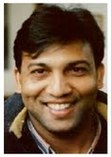
BY VICTOR LAL
In the days leading up to the 5 December 2006 coup the cat and mouse chase forced Laisenia Qarase, at the time the duly elected Prime Minister of Fiji, to finally flee to the safety of his home in Mavana in Vanuabalavu. He remained there and only returned to Suva to prepare for his court case against his deposers.
The question that the recent High Court judgment did not address, and I accept that it was not asked to consider, was whether the military, in confining Qarase to Mavana, was acting on the supposed and invisible “reserve powers” vested in the President, Ratu Josefa Iloilo.
And if the military was acting on the “reserve powers”, where did the military, through the President, get that power to confine the deposed Prime Minister in Mavana?
In a series of articles I will be arguing, based on the availability of new evidence as contained in the various court affidavits and other reliable sources, that the President’s constitutional powers ended the moment he allowed Commodore Frank Bainimarama to “step into his shoes” and all acts performed by the military afterwards in the President’s name, with or without his consent and blessing, has no basis in constitutional law.
In fact, the President did not have the reserve powers to perform the series of acts in the manner he did following the 2006 coup.
Meanwhile, I disagree with the Interim Attorney-General Aiyaz Sayed-Khaiyum’s warning to the media that he would not tolerate any contempt of court and comments on the recent judgment and anybody bringing the judiciary or the administration of justice into contempt will be called to account for their actions.
I presume he knows better as a student of law that the conduct of the judges and their judgements are open to scrutiny once a judgement has been delivered by a court: In Attorney General v Butterworth [1963] 1 Q.B. 696 it was held that at common law, “a contempt of court is an act or omission calculated to interfere with the due administration of justice.”
He must remember that the High Court has already delivered its verdict.
His constant threats to the media only re-enforce “the all-too-common tendency to view the attorney-general and his department as no more than the law firm that is always on call to serve the interest of the political party that is in power at the time”.
The A-G, despite his political role, and as supporter and adviser to the government, is meant to wear an apolitical hat in his parens patriae role as guardian of the public interest. The judiciary and the media are also guardians of the public interest.
In his fifth edition of Media Law (2008) Geoffrey Robertson QC, who successfully argued the Chandrika Prasad case before Justice Gates, writes on the issue of scandalising the court:
“Scandalising the court was invented in the eighteenth century to punish radical critics of the establishment, such as John Wilkes [In the context of 18th century politics it was an attempt to protect Lord Mansfield from reasoned criticism of his oppressive judicial behaviour towards Wilkes and other critics of the Government]."
Despite its apparent breadth, scandalising the court should not prevent criticism of the judiciary even when expressed in strong terms. “Justice is not a cloistered virtue” a senior Law Lord (Lord Atkin, Ambard v Att-Gen for Trinidad and Tobago, 1936), once said, and comment about the legal system in general or the handling of particular cases once they are over sometimes deserves to be trenchant… Scandalising the court is an anachronistic form of contempt.
Lord Diplock (Secretary of State for Defence v Guardian Newspapers Ltd (1985) has described it as “virtually obsolescent in the United Kingdom” and it has not been used here for 60 years.”
In their ruling in Qarase and Others v Bainimarama and Others, the three judges, acting Chief Justice Anthony Gates and Justices John Bryne and Davendra Pathik barely touched on Qarase’s enforced confinement on Mavava, but noted:
“In his pleadings Mr Qarase stated, ‘The next morning the Prime Minister escaped from Suva’. The defendants claim he left Suva that day, 6th December 2006, only to return to Suva on 4 October 2007. In his evidence Mr Qarase said he returned on 1 September 2007."
I must confess that academic lawyers (and practising lawyers and judges) not familiar with the events of 5 December 2006 will not be a position to do a thorough and just critique of the High Court judgment because Qarase’s legal arguments are woefully absent in the judgment.
Also, unlike Qarase who agreed to testify, both the President Ratu Josefa and Bainimarama (who flew all the way to New York to explain his actions to the UN General Assembly), chose not to appear before the High Court and to be cross-examined about their roles in the events prior to, during, and after the 2006 coup.
According to Qarase’s affidavit to the High Court of 24 September 2007, the following chain of events occurred:
(1) That since 6 December 2006, my freedom of movement was confined to my home island of Vanuabalavu in the Lau Group. My wish to return to Suva was prevented by threats against my safety and liberty regularly announced publicly by the First (Bainimarama) and Second (RFMF) Defendants in the local media. The only airline that services my island, Air Fiji, was reluctant to transport me out of Vanuabalavu for fear of Military reprisals. On 4 January, 2007 I received a telephone call from a person who identified himself as a Major Sitiveni Qilio in the Second Defendant warning me that I would be arrested by the Second Defendant, if I returned to Suva.
(2) That my application to this Court, through my lawyer, for orders to direct the First and Second Defendants not to impose restrictions on my freedom of movement guaranteed under the Constitution was opposed by the First and Second Defendants, and I crave leave to refer to their affidavit thereon sworn by one Major Sitiveni Tukaituraga Qiliho on 2.5.07, but this Honourable Court granted that order on 11.6.07, and I crave leave to refer to the said order.
(3) That despite the order of this Court described in paragraph 5 herein, and despite the fact that there was no state of emergency then existing, and despite the fact that there was no other legal restriction imposed upon me, the Chief Executive Officer of Air Fiji informed me by telephone on 28.8.07 that his airline was unable to transport me to Suva by a chartered flight on 29.8.07 as planned, because Air Fiji was warned by the Second Defendant not to transport me from Vanuabalavu.
There was wide local and international publicity about and condemnation of these continuing efforts by the Second Defendant to restrict my freedom of movement, in particular regarding my return to Suva to help prepare for my case.
I can understand why the Chief Executive of Air Fiji has denied his telephone confirmation to me that he was instructed by the Second Defendant not to transport me to Suva.
I was to charter one of their aircraft, and his Company needed the business, and this made his initial confirmation about his inability to transport me to Suva more credible, i.e. out of fear of possible military reprisals.
(3) That I also received a phone call on 28.8.07, in which a person who identified himself as calling from the Fiji Military Forces Camp threatened that I would be killed on arrival, if I returned to Suva.
The First and Second Defendants have denied and continue to deny any role in restricting my freedom of movement and the threats against my safety and liberty conveyed to me by telephone.
Strangely, coincidentally, Fiji Air’s reluctance to accept our request to charter one of their aircraft to transport me to Suva was refused on the same day.
I sincerely believe that the Second Defendants have had difficulty not only in denying that these events did take place, but more importantly in denying that they knew.
Moreover, the silent majority of the public of Fiji are familiar with this tactic of denials by the First and Second Defendants about their regime of violations of human rights since 5th December, 2006.
(4) That as a result of these difficulties, I did not manage to return to Suva by chartered flight until 1.9.07.
However, immediately before and since returning to Suva, incidents which continue to demonstrate the Second Defendant’s determined effort to restrict my freedom of movement, freedom of expression, freedom of association, and other human rights principles enshrined in the Constitution.”
In its judgment the High Court relied on the invisible powers of the English kings on the question of prerogative in sanctioning the President’s actions.
But we might want to recall that in the Magna Carta there is a ringing expression of freedom for mankind in the world over:
“No free man shall be taken or imprisoned or deprived or outlawed or exiled or in any way ruined, nor will we go or send against him, except by the lawful judgments of his peers or by the law of the land. To no one will we sell, to no one will we deny or delay right or justice.”
TO BE CONTINUED TOMORROW
In the days leading up to the 5 December 2006 coup the cat and mouse chase forced Laisenia Qarase, at the time the duly elected Prime Minister of Fiji, to finally flee to the safety of his home in Mavana in Vanuabalavu. He remained there and only returned to Suva to prepare for his court case against his deposers.
The question that the recent High Court judgment did not address, and I accept that it was not asked to consider, was whether the military, in confining Qarase to Mavana, was acting on the supposed and invisible “reserve powers” vested in the President, Ratu Josefa Iloilo.
And if the military was acting on the “reserve powers”, where did the military, through the President, get that power to confine the deposed Prime Minister in Mavana?
In a series of articles I will be arguing, based on the availability of new evidence as contained in the various court affidavits and other reliable sources, that the President’s constitutional powers ended the moment he allowed Commodore Frank Bainimarama to “step into his shoes” and all acts performed by the military afterwards in the President’s name, with or without his consent and blessing, has no basis in constitutional law.
In fact, the President did not have the reserve powers to perform the series of acts in the manner he did following the 2006 coup.
Meanwhile, I disagree with the Interim Attorney-General Aiyaz Sayed-Khaiyum’s warning to the media that he would not tolerate any contempt of court and comments on the recent judgment and anybody bringing the judiciary or the administration of justice into contempt will be called to account for their actions.
I presume he knows better as a student of law that the conduct of the judges and their judgements are open to scrutiny once a judgement has been delivered by a court: In Attorney General v Butterworth [1963] 1 Q.B. 696 it was held that at common law, “a contempt of court is an act or omission calculated to interfere with the due administration of justice.”
He must remember that the High Court has already delivered its verdict.
His constant threats to the media only re-enforce “the all-too-common tendency to view the attorney-general and his department as no more than the law firm that is always on call to serve the interest of the political party that is in power at the time”.
The A-G, despite his political role, and as supporter and adviser to the government, is meant to wear an apolitical hat in his parens patriae role as guardian of the public interest. The judiciary and the media are also guardians of the public interest.
In his fifth edition of Media Law (2008) Geoffrey Robertson QC, who successfully argued the Chandrika Prasad case before Justice Gates, writes on the issue of scandalising the court:
“Scandalising the court was invented in the eighteenth century to punish radical critics of the establishment, such as John Wilkes [In the context of 18th century politics it was an attempt to protect Lord Mansfield from reasoned criticism of his oppressive judicial behaviour towards Wilkes and other critics of the Government]."
Despite its apparent breadth, scandalising the court should not prevent criticism of the judiciary even when expressed in strong terms. “Justice is not a cloistered virtue” a senior Law Lord (Lord Atkin, Ambard v Att-Gen for Trinidad and Tobago, 1936), once said, and comment about the legal system in general or the handling of particular cases once they are over sometimes deserves to be trenchant… Scandalising the court is an anachronistic form of contempt.
Lord Diplock (Secretary of State for Defence v Guardian Newspapers Ltd (1985) has described it as “virtually obsolescent in the United Kingdom” and it has not been used here for 60 years.”
In their ruling in Qarase and Others v Bainimarama and Others, the three judges, acting Chief Justice Anthony Gates and Justices John Bryne and Davendra Pathik barely touched on Qarase’s enforced confinement on Mavava, but noted:
“In his pleadings Mr Qarase stated, ‘The next morning the Prime Minister escaped from Suva’. The defendants claim he left Suva that day, 6th December 2006, only to return to Suva on 4 October 2007. In his evidence Mr Qarase said he returned on 1 September 2007."
I must confess that academic lawyers (and practising lawyers and judges) not familiar with the events of 5 December 2006 will not be a position to do a thorough and just critique of the High Court judgment because Qarase’s legal arguments are woefully absent in the judgment.
Also, unlike Qarase who agreed to testify, both the President Ratu Josefa and Bainimarama (who flew all the way to New York to explain his actions to the UN General Assembly), chose not to appear before the High Court and to be cross-examined about their roles in the events prior to, during, and after the 2006 coup.
According to Qarase’s affidavit to the High Court of 24 September 2007, the following chain of events occurred:
(1) That since 6 December 2006, my freedom of movement was confined to my home island of Vanuabalavu in the Lau Group. My wish to return to Suva was prevented by threats against my safety and liberty regularly announced publicly by the First (Bainimarama) and Second (RFMF) Defendants in the local media. The only airline that services my island, Air Fiji, was reluctant to transport me out of Vanuabalavu for fear of Military reprisals. On 4 January, 2007 I received a telephone call from a person who identified himself as a Major Sitiveni Qilio in the Second Defendant warning me that I would be arrested by the Second Defendant, if I returned to Suva.
(2) That my application to this Court, through my lawyer, for orders to direct the First and Second Defendants not to impose restrictions on my freedom of movement guaranteed under the Constitution was opposed by the First and Second Defendants, and I crave leave to refer to their affidavit thereon sworn by one Major Sitiveni Tukaituraga Qiliho on 2.5.07, but this Honourable Court granted that order on 11.6.07, and I crave leave to refer to the said order.
(3) That despite the order of this Court described in paragraph 5 herein, and despite the fact that there was no state of emergency then existing, and despite the fact that there was no other legal restriction imposed upon me, the Chief Executive Officer of Air Fiji informed me by telephone on 28.8.07 that his airline was unable to transport me to Suva by a chartered flight on 29.8.07 as planned, because Air Fiji was warned by the Second Defendant not to transport me from Vanuabalavu.
There was wide local and international publicity about and condemnation of these continuing efforts by the Second Defendant to restrict my freedom of movement, in particular regarding my return to Suva to help prepare for my case.
I can understand why the Chief Executive of Air Fiji has denied his telephone confirmation to me that he was instructed by the Second Defendant not to transport me to Suva.
I was to charter one of their aircraft, and his Company needed the business, and this made his initial confirmation about his inability to transport me to Suva more credible, i.e. out of fear of possible military reprisals.
(3) That I also received a phone call on 28.8.07, in which a person who identified himself as calling from the Fiji Military Forces Camp threatened that I would be killed on arrival, if I returned to Suva.
The First and Second Defendants have denied and continue to deny any role in restricting my freedom of movement and the threats against my safety and liberty conveyed to me by telephone.
Strangely, coincidentally, Fiji Air’s reluctance to accept our request to charter one of their aircraft to transport me to Suva was refused on the same day.
I sincerely believe that the Second Defendants have had difficulty not only in denying that these events did take place, but more importantly in denying that they knew.
Moreover, the silent majority of the public of Fiji are familiar with this tactic of denials by the First and Second Defendants about their regime of violations of human rights since 5th December, 2006.
(4) That as a result of these difficulties, I did not manage to return to Suva by chartered flight until 1.9.07.
However, immediately before and since returning to Suva, incidents which continue to demonstrate the Second Defendant’s determined effort to restrict my freedom of movement, freedom of expression, freedom of association, and other human rights principles enshrined in the Constitution.”
In its judgment the High Court relied on the invisible powers of the English kings on the question of prerogative in sanctioning the President’s actions.
But we might want to recall that in the Magna Carta there is a ringing expression of freedom for mankind in the world over:
“No free man shall be taken or imprisoned or deprived or outlawed or exiled or in any way ruined, nor will we go or send against him, except by the lawful judgments of his peers or by the law of the land. To no one will we sell, to no one will we deny or delay right or justice.”
TO BE CONTINUED TOMORROW
From Fijileaks Archive, 8 October 2017:
During the mutiny trial, Shane Stevens at one point had claimed that Sitiveni Rabuka was behind the bloody 2 November 2000 mutiny. Rabuka denied the claim and he was subsequently acquitted of two counts of inciting mutiny after a jury panel of five civilian assessors failed to reach a unanimous verdict. The assessors had delivered a split, non-binding decision. Two assessors thought Rabuka had been guilty of both counts. One found him innocent of both counts. The final two found he was not guilty of the first count but guilty of the second.The Fiji Court of Appeal, led by Justice Gordon Ward, upheld the verdict of Justice Gerard Winter of the Fiji High Court. Under the laws of Fiji, judges can disregard the findings of the assessors
Outside the Fiji High Court, a smiling Rabuka after he was acquitted of the mutiny charges, said he was retiring from public life to set up a
water bottling business to be called "Silk Tail".
In 1987, he was also SMILING after executing his two COUPS. Now, SODELPA, while wrapping itself in Rabuka's TAIL, is telling us the two racially motivated Rabuka coups are all water under the bridge.
Whatever happened to the promised SILK TAIL water bottling business?
The Australian lawyer MARK TEDESCHI who prosecuted Rabuka in 2006
"Despite everything that was happening at the Queen Elizabeth barracks, Rabuka remained at the Sun Insurance lunch until around 5 p.m. when he finally left the Sun Insurance building with his driver and bodyguard and went to the apartments where he lived. It was alleged that the reason for him going home was to pick up his uniform as a Major General in the Army Reserves. He then went to the Queen Elizabeth barracks, armed with his uniform so that if called upon he could assume the role of Commander. When he arrived in his vehicle at the barracks sometime around 5.30-5.45pm, Rabuka was sitting in the front passenger seat of his red four wheel drive vehicle. His bodyguard was in the back seat. Various soldiers at the barracks, both loyalists and rebels, noticed that there was a senior officer’s uniform hanging in the back of the car. At that stage, the Lieutenant Colonels commanding the loyal soldiers were planning a counter-attack which was due to commence at 6 p.m.. When Rabuka found out about the planned counter-attack, he was horrified. It was alleged that he wanted a stalemate from which he could take some advantage, not a fierce fire-fight in which the rebels would most likely be decimated. Neither, it was suggested, did he want the rebels to surrender, because one cannot bargain from a position of surrender. It was alleged that Rabuka attempted to convince the senior officer in command of the loyalist soldiers to negotiate with the rebel soldiers, rather than launching a counter-attack, but the senior officer refused. Major General Rabuka was unceremoniously placed sitting on the floor in a secure room and then moved to another part of the barracks where he was out of the line of fire during the counter-attack. At one stage, he was chastised for using his mobile phone, and eventually his mobile phone was confiscated. At 6 p.m., the counter-attack commenced and by 6:45 p.m. the rebel soldiers had been completely defeated. Some of the rebel soldiers surrendered at the barracks, while some of them, including Lt Charles Dukuliga, literally ran away from the barracks in fear of their lives. Many of those who ran away were hunted down over the next few days and taken into custody. Five of these captured rebel soldiers were taken back to the barracks where they were bashed to death. This was the subject of later police investigations, but at the present time no one has been charged with these killings and the investigation has recently been terminated. Lt Charles Dukuliga was bashed into unconsciousness, but remained alive.
Many of the loyalist soldiers were convinced that Major General Rabuka had played a role in assisting the mutiny. After the rebels had been defeated, some of the loyal soldiers wanted to summarily execute Rabuka where he had been sheltering during the counter-attack, but a middle-ranking officer (now a senior legal officer in the DPP Office) refused to allow them to do so, largely because he could not establish the identity of the officer who had given the order to kill Rabuka. Later that evening, as Rabuka was leaving the QEB, he allegedly rang Seruvakula again and said "There has been a setback in what has happened. It has failed, and some lives have been lost. I'm going out to drink yaqona]." It was alleged by the prosecution at the trial that what had failed was Rabuka's grand plan to replace the Commander [Bainimarama].
On 11th December 2006, the five Assessors returned with their recommended verdicts. By a majority of three to two, they recommended that Rabuka be acquitted on the first charge. By a majority of four to one, they recommended that Rabuka be convicted on the second charge (the conversation with Seruvakula during the mutiny). When Justice Winter retired to consider his verdicts, it never seriously occurred to me that he might depart from the recommendations of the Assessors. The five Assessors came from a broad spectrum of the Fijian community as a whole and I was of the view that it was highly unlikely that an expatriate New Zealander who had only been a local judge for a little over 18 months would depart from the views of these representatives of the community. However, when Justice Winter returned about an hour later, he announced the acquittal of Rabuka on both charges. As required by law, he provided his reasons.
He stated that he was of the view that the prosecution had failed to prove its case on either count beyond a reasonable doubt.
